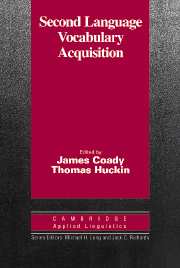Book contents
- Frontmatter
- Contents
- List of contributors
- Series editors' preface
- Acknowledgments
- I SETTING THE STAGE
- II CASE STUDIES
- Chapter 4 Vocabulary and comprehension: Two portraits
- Chapter 5 Oral production of vocabulary: A case study
- Chapter 6 Reading and vocabulary development in a second language: A case study
- III EMPIRICAL RESEARCH
- IV PEDAGOGY
- V SUMMING UP
- Author index
- Subject index
Chapter 6 - Reading and vocabulary development in a second language: A case study
Published online by Cambridge University Press: 05 October 2012
- Frontmatter
- Contents
- List of contributors
- Series editors' preface
- Acknowledgments
- I SETTING THE STAGE
- II CASE STUDIES
- Chapter 4 Vocabulary and comprehension: Two portraits
- Chapter 5 Oral production of vocabulary: A case study
- Chapter 6 Reading and vocabulary development in a second language: A case study
- III EMPIRICAL RESEARCH
- IV PEDAGOGY
- V SUMMING UP
- Author index
- Subject index
Summary
Introduction
Researchers in reading seldom have the opportunity to experience, as adults, an extended period of time learning to read. Although it is virtually impossible to have such an adult experience in one's first language, it is possible to find oneself in such a fortuitous situation in a second language (L2) context. This situation arose for the first author of this chapter when he spent 5 months in Brazil in 1990. Since he was not a speaker or reader of Portuguese, he took that opportunity to learn to read in Portuguese. This paper is a report of that case study, the outcomes after 5 months, and the records and reflections on the experience. As a case study, this report cannot make claims for statistical generalizations. There are, however, a number of important methodological advantages and research insights to this type of case study that cannot easily be explored experimentally (McCormick, 1993; Neuman & McCormick, 1995).
As a research methodology, a small number of published case studies document the learning of a second or foreign language and second language (L2) teacher education (Bailey, 1980, 1983; Porter, Goldstein, Leatherman, & Conrad, 1990; Schmidt & Frota, 1986; Schumann, 1980; Schumann & Schumann, 1977; see Bailey, 1990, for a review of diary studies in teacher education). Few case studies, however, specifically address the development of L2 reading and vocabulary skills (see Parry, 1993). The research reported here represents an effort to explore L2 reading and vocabulary development through such a methodology.
- Type
- Chapter
- Information
- Second Language Vocabulary AcquisitionA Rationale for Pedagogy, pp. 98 - 122Publisher: Cambridge University PressPrint publication year: 1996
- 8
- Cited by



